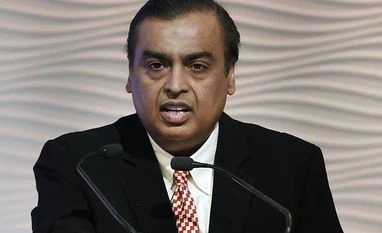Mukesh Ambani-promoted Reliance Industries (RIL) reported a 9.8 per cent year-on-year (YoY) rise in consolidated net profit for the quarter ended March 2019, backed by better numbers in its retail and telecom business.
The quarter under review also saw significant debt reduction with a 21 per cent decrease sequentially in net debt, down to Rs 1.54 trillion at the end of the March 2019 quarter.
For the January-March 2019 quarter, the company reported its highest ever quarterly profit at Rs 10,362 crore, up 9.8 per cent from Rs 9,438 crore in the corresponding quarter a year ago.
In the December quarter, RIL had posted net profit of Rs 10,251 crore.
However, on a standalone basis, RIL’s profit after tax for the quarter declined 1.6 per cent YoY to Rs 8,556 crore, the first time since December 2014 quarter, on account of lower refining profits.
For 2018-19, the company reported net profit of Rs 39,588 crore, up 13.1 per cent from the previous year.
Revenues for the quarter under review were seen up 19.4 per cent to Rs 1.54 trillion compared to Rs 1.29 trillion in the same quarter a year ago.
In a Bloomberg poll, 14 analysts estimated RIL’s consolidated net profit at Rs 9,796 crore and 12 analysts estimated revenue at Rs 1.48 trillion.
“During FY19, we achieved several milestones and made significant strides in building Reliance of the future. Reliance Retail crossed Rs 1 trillion revenue milestone, Jio now serves over 300 million consumers and our petrochemicals business delivered its highest ever earnings,” said Mukesh Ambani, chairman and managing director, RIL. The company’s refining business — both for the quarter and the full year — has been a drag on its overall financial performance.
The gross refining margins (GRM) for the March quarter was at $8.2 per barrel, compared to $11.1 per barrel reported in the year-ago quarter. The March 2019 quarter GRM is the lowest since the October-December 2014 period, which was at $7.3 per barrel.
“The quarter under review was flattish (sequentially), refining is weaker than what it was and was compensated only by the consumer business, because petchem was also flat. The consumer business now contributes almost 25 per cent to our earnings,” said V Srikanth, joint chief financial officer, RIL. He added, “On a whole year basis, the fall in GRM is reflecting in the overall fall in earnings before interest and tax (EBIT).” The refining segment EBIT declined 19.8 per cent YoY.
Srikanth expects the GRM to remain stable, with likely benefit arising out of the International Maritime Organisation (IMO) guidelines, which require global shipping companies to use cleaner fuel starting 2020.
In the quarter under review, the company also completed transferring its digital fibre and tower assets to its newly formed two infrastructure investment trusts (InvITs). “This transaction has led to deleveraging of Reliance Jio Infocomm (RJIL) balance sheet; future capex on passive infrastructure assets would be undertaken by the two entities. Liabilities worth Rs 1.07 trillion have been transferred from RJIL,” the company said in its statement.
Srikanth added the company’s current outstanding and net debt reflected the liabilities transferred. However, he expects a further reduction in debt once the sale of units in the two InvITs is complete. As of March 2019, the company’s outstanding debt was at Rs 2.87 trillion against Rs 2.18 trillion a year ago. The debt figures are also reflective of the stake sale that the company has agreed to in six companies holding one very large ethane carrier each. The company spent Rs 20,000 crore as capex for the telecom business in the March quarter.
On its gasification project, the company said all units of the gasification complex were operational and the complex was under stabilisation.
Analysts were sceptical of the company’s ramp-up plans owing to weakness in spot gas prices. “Given the current outlook of energy prices the gasification economics remain robust and RIL is confident of achieving targeted returns,” the company said.
The company’s retail segment revenue for the quarter grew by 51.6 per cent to Rs 36,663 crore against Rs 24,183 crore in the March 2018 quarter. Retail business profit before interest, depreciation, interest and taxation for the March 2019 quarter grew by 77.1 per cent YoY to Rs 1,923 crore from Rs 1,086 crore in the fourth quarter of 2017-18.
Unlock 30+ premium stories daily hand-picked by our editors, across devices on browser and app.
Pick your 5 favourite companies, get a daily email with all news updates on them.
Full access to our intuitive epaper - clip, save, share articles from any device; newspaper archives from 2006.
Preferential invites to Business Standard events.
Curated newsletters on markets, personal finance, policy & politics, start-ups, technology, and more.
)